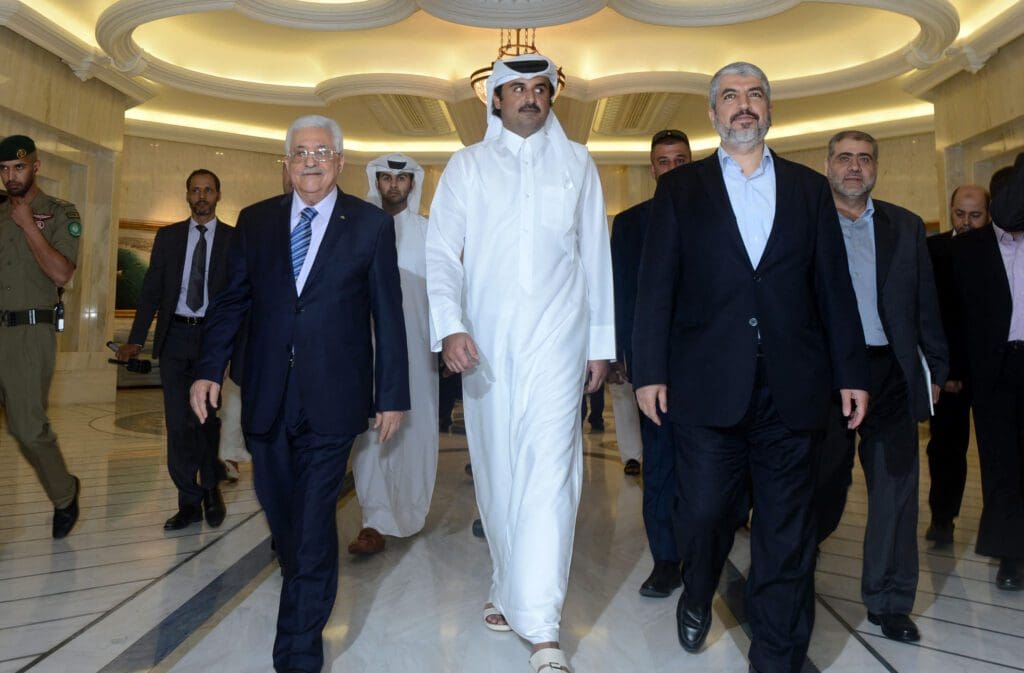“Tell Hamas that they must deliver on a hostage and ceasefire deal that would halt the war in Gaza or risk getting kicked out of the Qatari capital of Doha.” That was U.S. Secretary of State Antony Blinken’s message to Qatar in early March, according to a report by CNN five months into Israel’s war on the Gaza Strip. But the American network’s revelation ran counter to a report in the Times of Israel saying that when Qatar’s Emir had offered to expel Hamas, days after the group attacked Israel from Gaza on October 7, Blinken suggested Qatar could better use its connections with the group to mediate a ceasefire.
The conflicting reports encapsulate Washington’s dilemma over Qatar’s ties with Hamas. On the one hand, the administration faces pressure from Israel and pro-Israel groups to press Doha to end its long-standing relationship with the group. On the other, both the U.S. and Israel know that effective communication is crucial for reaching agreements, and Qatar—a key American ally which nonetheless maintains ties with some of Washington’s bitterest foes—has repeatedly demonstrated its value as a regional mediator. Moreover, ousting Hamas leaders from Qatar could harm, rather than benefit, Washington’s interests in the region.
The CNN report was not the first sign of tensions over Doha’s ties with Hamas. In late October, the Washington Post reported that Qatar and the U.S. had agreed to revisit the issue once the current crisis is over. Since then, both U.S. and Israeli officials have stepped up the pressure on Doha. Members of Congress and the Senate, think tanks such as the pro-Israel Foundation for Defense of Democracies (FDD), and Trump-era officials have demanded that the Biden administration apply various forms of pressure on Qatar to oust the group’s leaders.
Israel’s Prime Minister Benjamin Netanyahu has also personally worked to sabotage Doha’s mediation efforts. He recently pushed for shutting down the local Al Jazeera office, which has been reporting from the field in Gaza around the clock since Israel launched its military operation. In January, Netanyahu’s office leaked a recording of him demonizing Qatar and voicing displeasure over the renewal, days earlier, of the U.S. military presence in Qatar. This prompted the State Department to publicly defend Qatar’s “integral role” in the region.
This psychological warfare against Qatar seems designed to divert attention away from the long-standing Israeli occupation of the Palestinian territories, as well as Netanyahu’s role in what many experts rightly see as the first live-broadcasted genocide in history. The anti-Qatar narrative also implies that the Gulf state should be working in favor of Israel—a problematic expectation as it undermines Doha’s efforts to mediate with both sides. It also fails to recognize the roots of the problem and the need for American pressure on Israel to reach an agreement.
Moreover, as Qatari officials have pointed out, the Hamas office in Doha was opened in response to a request from the U.S., which recognized the need for indirect lines of communication with the group. Doha is uniquely suited to this role, maintaining both a close alliance with Washington and a long-standing relationship with Hamas.
Ultimately, the fate of the group’s presence in Doha and of Qatar-Hamas relations will depend on several dynamics, including the fate of Hamas itself, how far Israel can go in its campaign against Doha, Qatar’s own position, and the state of the U.S.-Qatar relationship.
Qatar as U.S. Ally, Regional Mediator
During the last few decades, the relationship between the U.S. and Qatar has evolved into a complex and multifaceted partnership characterized by mutual strategic interests and cooperation in various sectors. This is underlined by the U.S. designation of Qatar as a major non-NATO ally, a status granted to very few countries, indicating the indispensable ties between Doha and Washington, especially on security.
Qatar’s previous mediation efforts, including peace talks with Afghanistan’s Taliban before and during the U.S. evacuation in 2021, exemplify the country’s reliability as a strategic partner. The U.S. has repeatedly hailed Qatar’s efforts, which have been pivotal in advancing peace, security, and stability in the region as well as securing the U.S. interests.
The wide-ranging U.S.-Qatar Strategic Dialogue has further reinforced this relationship, resulting in the January extension of U.S. forces’ presence at Al Udeid Air Base for an additional ten years. This base, due to its location, not only bolsters the strategic defense partnership between the U.S. and Qatar but also contributes to the security of the region.
Qatar’s ties with Hamas have enabled the U.S. to maintain communications with the Palestinian group, especially since it fell out with the Assad regime in Syria in 2011 and its leaders moved to Doha. Since then, Qatari mediation has played a vital role in ceasefires between Israel and Hamas in 2014, 2021, and 2022. Official Israeli documents revealed in March show that Israel, including former Mossad Chief Yossi Cohen, for years “sought and valued” Qatar’s role in Gaza.
All this suggests that the current U.S. administration is unlikely to pressure Doha to sever ties with Hamas or expel its officials, especially as war rages in Gaza and threatens to metastasize.
The Threat of Assassinations
From Qatar’s perspective, maintaining ties with Hamas is imperative, especially in the short term. Diplomacy and mediation are at the core of the small, gas-rich Gulf nation’s foreign policy. Doha has been highly successful in this domain, to the point that it can ill afford to avoid involvement in regional crises such as the current one between Hamas and Israel.
Moreover, an increasing number of experts and officials believe that Israel’s goal of eliminating of Hamas is unrealistic. The fact that Israel has unleashed massive destruction on Gaza and killed more than 32,000 Palestinians, over 70% of them children and women, rather than destroying Hamas, clearly demonstrates the importance of diplomacy and mediation—roles Qatar is uniquely placed to fulfill.
A decision to end this role would be self-defeating for Qatar. That said, the question remains whether Doha can ensure the safety of Hamas leaders on its soil, in light of Israel’s threats to assassinate them—and whether Israel might follow through.
The January assassination in Lebanon of Saleh al-Arouri, the deputy chief of Hamas’ political bureau, once again highlighted Israel’s policy of targeted killings. Over the decades, Israel has assassinated Palestinian leaders of various affiliations in many Arab countries, including the United Arab Emirates, Lebanon, and Tunisia. In 1997, it attempted to poison Khaled Mashaal, then head of the Hamas political bureau, in Jordan. In response, then-King Hussein threatened to terminate the peace agreement with Tel Aviv unless an antidote was provided and the spiritual founder of Hamas, Ahmad Yassin, was released. Israel complied.
Israel did assassinate Mahmoud al-Mabhouh, the Hamas chief for logistics and weapons procurement, in the UAE in 2010. That operation, however, caused a diplomatic scandal, as Dubai police discovered that 26 Mossad agents had used passports from numerous Western countries to carry out the operation.
That episode serves as a reminder that an Israeli operation to target Hamas leaders in Doha would be counterproductive. Not only would it wipe out communications channels with Hamas, destabilize the security situation in the region, and further undermine the U.S. security role in the Gulf, but it would also potentially create a crisis in the Israeli-American relations, given Doha’s support for U.S. interests.
Such an operation would also indicate that Netanyahu seeks to expand the scope and scale of the current conflict beyond Gaza, posing another threat to U.S. interests as well as highlighting Netanyahu’s failure domestically.
Would a different U.S. administration reconsider the whole issue and decide that the Hamas office in Doha should be closed? This is possible. However, it is hard to see this happening as long as the conflict continues in Gaza. It is also difficult to imagine how such a move would advance U.S. interests, especially if the office is moved to a state that is less friendly towards Washington.


